Related Research Articles
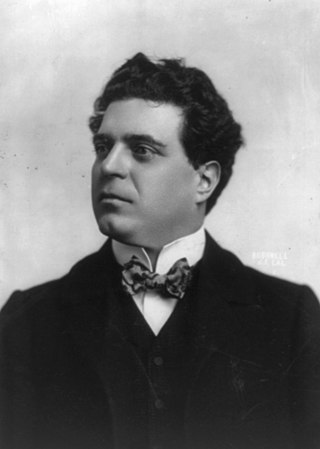
Pietro Mascagni was an Italian composer primarily known for his operas. His 1890 masterpiece Cavalleria rusticana caused one of the greatest sensations in opera history and single-handedly ushered in the Verismo movement in Italian dramatic music. While it was often held that Mascagni, like Ruggero Leoncavallo, was a "one-opera man" who could never repeat his first success, L'amico Fritz and Iris have remained in the repertoire in Europe since their premieres.

Georges Prêtre was a French orchestral and opera conductor.
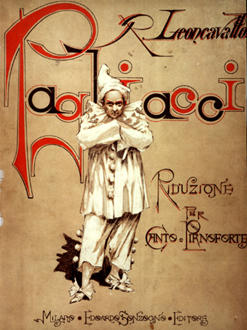
Pagliacci is an Italian opera in a prologue and two acts, with music and libretto by Ruggero Leoncavallo. The opera tells the tale of Canio, actor and leader of a commedia dell'arte theatrical company, who murders his wife Nedda and her lover Silvio on stage during a performance. Pagliacci premiered at the Teatro Dal Verme in Milan on 21 May 1892, conducted by Arturo Toscanini, with Adelina Stehle as Nedda, Fiorello Giraud as Canio, Victor Maurel as Tonio, and Mario Ancona as Silvio. Soon after its Italian premiere, the opera played in London and in New York. Pagliacci is the best-known of Leoncavallo's ten operas and remains a staple of the repertoire.

Le Villi is an opera–ballet in two acts composed by Giacomo Puccini to an Italian libretto by Ferdinando Fontana, based on the short story "Les Willis" by Jean-Baptiste Alphonse Karr. Karr's story was in turn based in the Central European legend of the Vila, also used in the ballet Giselle. The opera, in its original one-act version, premiered at Milan's Teatro Dal Verme, on 31 May 1884.
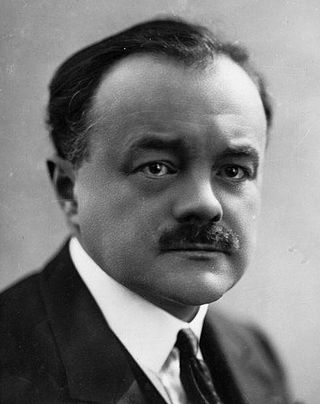
Albert Louis Wolff was a French conductor and composer of Dutch descent. Most of his career was spent in European venues, with the exception of two years that he spent as a conductor at the Metropolitan Opera and a few years in Buenos Aires during the Second World War. He is most known for holding the position of principal conductor with the Opéra-Comique in Paris for several years. He was married to the French mezzo-soprano Simone Ballard.

Zazà is an opera by Ruggero Leoncavallo, with a libretto by the composer, which draws on the same material as the French play Zaza (1898). The story concerns the French music hall singer, Zazà, and her affair and subsequent decision to leave her lover, Milio, when she discovers that he is married. The music is influenced by the French music halls where Leoncavallo had spent his early years as a composer.

Roberto Abbado is an Italian opera and symphonic music conductor. Currently he is an Artistic Partner of The Saint Paul Chamber Orchestra. In 2015 he has been appointed music director of Palau de les Arts Reina Sofia in Valencia, Spain. From 2018 he's Music Director of the Festival Verdi in Parma. Previously he held the position of Chief Conductor of Münchner Rundfunkorchester.

Cyrano de Bergerac is a four-act opera with music by Franco Alfano, and libretto by Henri Caïn, based on Edmond Rostand's 1897 drama Cyrano de Bergerac.

Cesira Ferrani was an Italian operatic soprano who is best known for debuting two of the most iconic roles in opera history, Mimì in the original 1896 production of Giacomo Puccini's La bohème and the title role in Puccini's Manon Lescaut in its 1893 world premiere. Ferrani sang a wide repertoire that encompassed not only verismo opera but the works of composers like Verdi, Gounod, Wagner, and Debussy.

Le maschere is an opera in a prologue and three acts by Pietro Mascagni to an Italian libretto by Luigi Illica.

Leopoldo Mugnone was an Italian conductor, especially of opera, whose most famous work was done in the period 1890–1920, both in Europe and South America. He conducted various operatic premieres, and was also a composer of operas.
Emilio Venturini (1878–1952) was an Italian operatic lyric tenor known for his portrayal of character roles. He made his professional opera debut in 1900 in Italy where he remained for the next several years. In 1901 he sang the role of Brighella in Mascagni's Le maschere at the Teatro Regio in Turin. He made his La Scala debut in 1903 as Froh in Wagner's Das Rheingold and sang in the premiere of Umberto Giordano's Siberia. In 1904, he originated the role of Prince Yamadori in Puccini's Madama Butterfly at La Scala.

Celestina Boninsegna was an Italian operatic dramatic soprano, known for her interpretations of the heroines in Verdi's operas. Although particularly eminent in Verdi's works, she sang a wide repertoire during her 25-year career, including Rosaura in the world premiere of Mascagni's Le maschere. Boninsegna made many recordings between 1904 and 1918, and her voice was one of the most successfully captured on disc during that period.
Antonio Magini-Coletti was a leading Italian baritone who had a prolific career in Europe and the United States during the late 19th century and the early part of the 20th century. A versatile artist, he appeared in several opera world premieres but was particularly associated with the works of Giuseppe Verdi, Richard Wagner and the verismo composers. He was also an accomplished exponent of the bel canto repertoire.
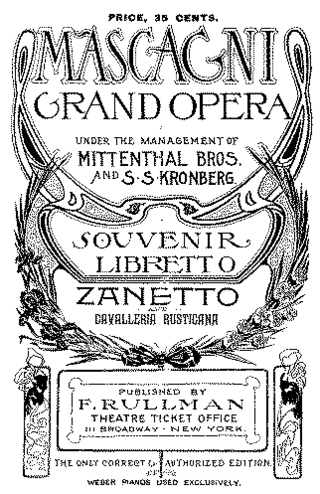
Zanetto is an opera in one act by Pietro Mascagni to an Italian libretto by Giovanni Targioni-Tozzetti and Guido Menasci. It received its first performance on 2 March 1896 at the Liceo Musicale Rossini in Pesaro. Only 40 minutes long and with cast of two singers, Zanetto was originally described by its composer as a scena lirica rather than an opera. It is set in the countryside near Florence during the Renaissance and tells the story of an encounter between a beautiful courtesan, Silvia, and a young wandering minstrel, Zanetto. The libretto was adapted from an Italian translation by Emilio Praga of François Coppée's play Le passant in which the young Sarah Bernhardt had won fame in the en travesti role of Zanetto.
Gaetano Bavagnoli was an Italian conductor who was particularly known for his work within the field of opera. He was mainly active within Italy's major opera houses during the first third of the 20th century; although he did conduct at important international stages like the Metropolitan Opera in New York City and the Royal Opera House in London as well. He also worked as a voice teacher and was notably the instructor of opera singers Emanuel Kopecky, Lina Pagliughi, and Aureliano Pertile.
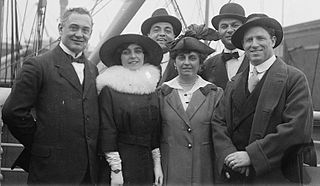
Vincenzo Reschiglian was an Italian operatic baritone who specialized in the comprimario repertoire.

The Conservatorio Statale di Musica "Gioachino Rossini" is a music conservatory in Pesaro, Italy. Founded in 1869 with a legacy from the composer Gioachino Rossini, the conservatory officially opened in 1882 with 67 students and was then known as the Liceo musicale Rossini. By 2010 it had an enrollment of approximately 850 students studying for higher diplomas in singing, instrumental performance, composition, musicology, choral conducting, jazz or electronic music. The conservatory also trains music teachers for secondary schools and holds regular master classes. Its seat is the 18th century Palazzo Olivieri–Machirelli on the Piazza Oliveri in Pesaro. Amongst its past Directors are the composers Carlo Pedrotti, Pietro Mascagni, Riccardo Zandonai and Franco Alfano. Mascagni's opera Zanetto had its world premiere at the conservatory in 1896.

Sì is an operetta in three acts composed by Pietro Mascagni to a libretto by Carlo Lombardo with verses by Arturo Franci. The libretto is based on Lombardo's operetta La duchessa del Bal Tabarin and Felix Dörmann's libretto for Majestät Mimi set by Bruno Granichstaedten in 1911. Mascagni's only venture into operetta, it premiered on 13 December 1919 at the Teatro Quirino in Rome. The operetta takes its name from its central character, Sì, an actress at the Folies Bergère, so called because she could never say no.
Philip Booth is an American operatic bass who is chiefly associated with the basso profundo repertoire. Now retired from performance, he was particularly active with the Metropolitan Opera in New York City where he gave more than 400 performances from 1975 to 1995.
References
- ↑ "Roberto Moranzoni". Oxford Music Online , entry written 1992. (paywalled online access)